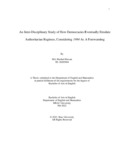| dc.contributor.advisor | Amin, Seema Nusrat | |
| dc.contributor.author | Hassan, Md. Hasibul | |
| dc.date.accessioned | 2022-05-16T06:24:29Z | |
| dc.date.available | 2022-05-16T06:24:29Z | |
| dc.date.copyright | 2022 | |
| dc.date.issued | 2022-02 | |
| dc.identifier.other | ID 20203044 | |
| dc.identifier.uri | http://hdl.handle.net/10361/16612 | |
| dc.description | This thesis is submitted in partial fulfillment of the requirements for the degree of Bachelor of Arts in English, 2022. | en_US |
| dc.description | Cataloged from PDF version of thesis. | |
| dc.description | Includes bibliographical references (pages 115-119). | |
| dc.description.abstract | For decades following World War II, the inadequacies and opulence exhibited by dictatorships had prompted people to refocus their attention toward democratic administration. Democracy was triumphant in the Cold War against Totalitarians. It swept the board because of the overwhelming support it received from the general public. Despite the fact that totalitarianism had diminished in practical value, the democratic ruler in the contemporary world has maintained many of its trademarks, which are intricately linked to Oceania's depiction in 1984.
The purpose of this paper is to conduct an impartial examination into why democratic rulers implement almost comparable policy initiatives to govern a nation like authoritarian states, how political functionalities of Big Brother have remoulded into newer shape in the twenty-first century democratic capitalist world, how we all the citizens are part of this. Affixing viewpoints penned in the book The Dictator’s Handbook with the political stratagem taken by The Big Brother, some of the other autocratic and democratic leaders, this paper aims to examine the deeper reasons behind how and why authoritarian approaches are taken into account by the democratic leaders. | en_US |
| dc.description.statementofresponsibility | Md. Hasibul Hassan | |
| dc.format.extent | 119 pages | |
| dc.language.iso | en | en_US |
| dc.publisher | Brac University | en_US |
| dc.rights | Brac University theses are protected by copyright. They may be viewed from this source for any purpose, but reproduction or distribution in any format is prohibited without written permission. | |
| dc.subject | Democracy | en_US |
| dc.subject | Authoritarian regimes | en_US |
| dc.title | An inter-disciplinary study of how democracies eventually emulate authoritarian regimes, considering 1984 as a forewarning | en_US |
| dc.type | Thesis | en_US |
| dc.contributor.department | Department of English and Humanities, Brac University | |
| dc.description.degree | B.A. in English | |

